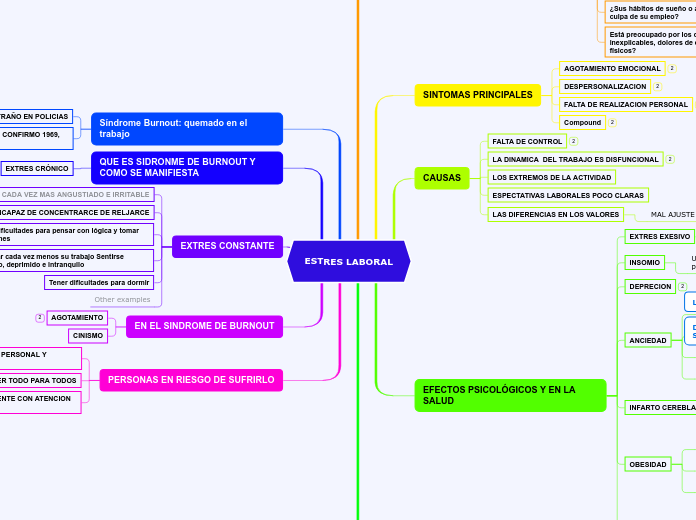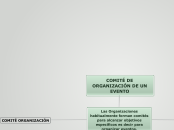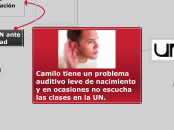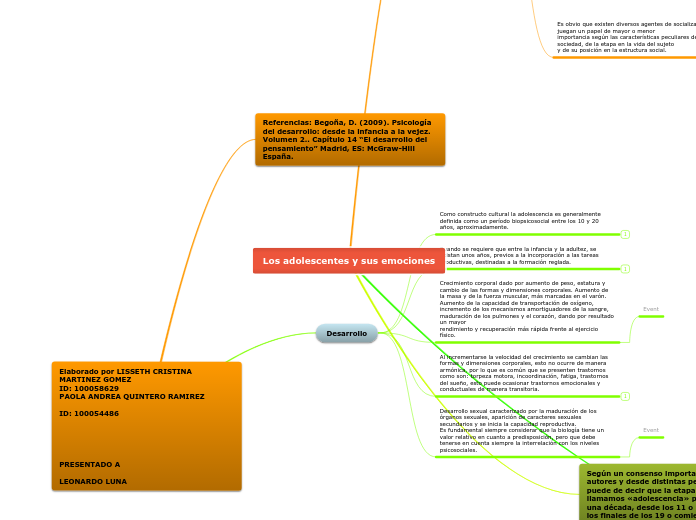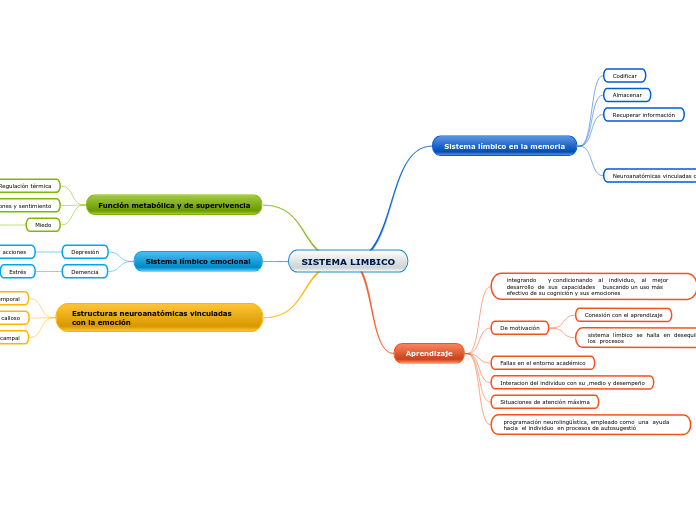DESEQUILIBRIO ENTRE LA VIDA LABORAL SOCIAL Y FAMILIAR
LA FALTA DE APOYO SOCIAL
ESTRES LABORAL
The part of speech is a category to which a word is assigned according to its syntactic functions. In English the main parts of speech are noun, pronoun, adjective, determiner, verb, adverb, preposition, conjunction, and interjection.
PERSONAS EN RIESGO DE SUFRIRLO
A conjunction is a word like 'if' 'but' or 'and' which is used to connect sentences or clauses together.
RELACIONADOS DIRECTAMENTE CON ATENCION AL CLIENTE
INTENTA SER TODO PARA TODOS
Subordinating conjunctions are conjunctions that are used at the beginning of subordinate clauses. Some examples of these conjunctions are: although, after, before, because, how, if, once, since, so that, until, unless, when etc.
Although it was raining, I went out.
DESEQUILIBRIO EN SU VIDA PERSONAL Y LABORAL
Coordinating conjunctions always connect phrases, words, and clauses. They are: for, and, nor, but, or, yet, so.
This stew is savory and delicious.
EN EL SINDROME DE BURNOUT
A preposition is one of the most exciting parts of grammar. A preposition is used to describe the location of something in relation to something else.
CINISMO
Compound preposition consists of two or more words.
AGOTAMIENTO
When a preposition consists of one word it is called single or simple preposition.
in, at, on, to for, of, from, up, after, over, under, with, etc.
EXTRES CONSTANTE
An interjection is used to express emotion in a sentence.
Think of other interjections!
Other examples
Tener dificultades para dormir
Disfrutar cada vez menos su trabajo Sentirse cansado, deprimido e intranquilo
Tener dificultades para pensar con lógica y tomar decisiones
SER INCAPAZ DE CONCENTRARCE DE RELJARCE
ESTAR CADA VEZ MAS ANGUSTIADO E IRRITABLE
QUE ES SIDRONME DE BURNOUT Y COMO SE MANIFIESTA
An adverb is used to describe a verb, but it can also describe an adjective or another adverb.
Adverbs normally help paint a fuller picture by describing how something happens.
EXTRES CRÓNICO
Carefully, Slowly
Síndrome Burnout: quemado en el trabajo
A numeral is a word or phrase that describes a numerical quantity.
Some theories of grammar use the word 'numeral' to refer to cardinal numbers that act as a determiner to specify the quantity of a noun, for example the 'two' in 'two hats'.
AÑOS QUE SE PRESENTO Y SE CONFIRMO 1969, 1974 Y 1986
One, two..
COMPORTAMIENTO EXTRAÑO EN POLICIAS
First, second..
TERAPIA TRATAMIENTO Y CONSEJOS
An article is a word used to modify a noun, which is a person, place, object, or idea. Technically, an article is an adjective, which is any word that modifies a noun.
HACER EJERCICIOS
EVALUE SUS INTERESES HABILIDADES Y PASIONES
BUSQUE APOYO
AJUSTE SU ACTITUD
EVALUE SUS OPCIONES
Indefinite articles are the words 'a' and 'an.' Each of these articles is used to refer to a noun, but the noun being referred to is not a specific person, place, object, or idea. It can be any noun from a group of nouns.
A car in the parking lot.
ADMINISTRE LOS FACTORES EXTRESANTES
It refers directly to a specific noun or groups of nouns.
The breakfast on my plate.
EFECTOS PSICOLÓGICOS Y EN LA SALUD
A pronoun is a word that can be used in place of a noun, typically after the noun itself has already been stated.
BULNERABILIDAD A LAS ENFERMEDADES
Unlike demonstrative pronouns, which point out specific items, indefinite pronouns are used for non-specific things. This is the largest group of pronouns. All, some, any, several, anyone, nobody, each, both, few, either, none, one, and no one are the most common.
ASMA
ALERGIAS
DOLORES MUSCULARES
OBESIDAD
Relative pronouns are used to add more information to a sentence. Which, that, who (including whom and whose), and where are all relative pronouns.
DESORDEN GASTROINTESTINALES
PERDIDA DE PESO
ULSERA
INFARTO CEREBLAR
Interrogative pronouns are used in questions. Although they are classified as pronouns, it is not easy to see how they replace nouns. Who, which, what, where, and how are all interrogative pronouns.
COLICOS MESTRUALES
MIGRAÑAS
ANCIEDAD
Reciprocal pronouns are used for actions or feelings that are reciprocated. The reciprocal pronouns are each other and one another.
DIABETES SOBRE TODO EN MUJERES
COLESTEROL ALTO
DETERIORO CARDIOVASCULAR
ALCOHOL O ABUSO DE SUSTANCIAS
DEPRECION
A reflexive pronoun ends with ...self or ...selves and refers to another noun or pronoun in the sentence (usually the subject of the sentence). The reflexive pronouns are myself, yourself, herself, himself, itself, ourselves, yourselves, and themselves.
Itself, Himself
INSOMIO
Demonstrative pronouns are used to demonstrate (or indicate). This, that, these, and those are all demonstrative pronouns.
Un desbordamiento negativo en las relaciones personales o vida en el hogar
EXTRES EXESIVO
Possessive pronouns are used to show possession. The possessive pronouns are mine, yours, his, hers, ours, and theirs.
FATIGA
CAUSAS
An adjective is a word that's used to describe a specific noun and to provide more detail to the listener.
LAS DIFERENCIAS EN LOS VALORES
MAL AJUSTE DE EMPLEO
ESPECTATIVAS LABORALES POCO CLARAS
LOS EXTREMOS DE LA ACTIVIDAD
LA DINAMICA DEL TRABAJO ES DISFUNCIONAL
Superlative adjectives demonstrate a higher level of comparison between entities.
She is the prettiest princess.
FALTA DE CONTROL
Expresses a comparison between two entities or groups of entities in quality or degree.
He is taller than she is.
SINTOMAS PRINCIPALES
A noun is defined as a person, place, thing or idea. Proper nouns always begin with a capital letter. Common nouns, which are general words, such as 'cars,' are not capitalized.
Compound
Compound nouns are words where two nouns have been stuck together to make a new noun. Compound nouns should be written as one word, without a hyphen.
Candlestick
FALTA DE REALIZACION PERSONAL
A noun which refers to a group of things/people.
Family, Class
DESPERSONALIZACION
Countable nouns are nouns that can be counted, even if the number might be extraordinarily high.
Uncountable nouns are nouns that come in a state or quantity which is impossible to count; liquids are uncountable, as are things which act
like liquids.
Cats, Rain
AGOTAMIENTO EMOCIONAL
Proper nouns are the names of specific people or places. They should always begin with a capital letter.
Create sentences
Mary, Paris
COMO SABER SI TENGO BURNOUT
A verb is an action word or 'doing' word that signifies movement in some way.
Está preocupado por los dolores de cabeza inexplicables, dolores de espalda u otros problemas
físicos?
¿Sus hábitos de sueño o apetito han cambiado por culpa de su empleo?
¿Está consumiendo excesiva comida, drogas o el alcohol para sentirse mejor?
¿Se siente desilusionado con su trabajo?
¿Le falta la satisfacción en sus logros?
An auxiliary verb helps the main (full) verb and is also called a 'helping verb.' With auxiliary verbs, you can write sentences in different tenses, moods, or voices.
¿Le falta la energía para ser consistentemente productivo?
A participle is a verb form that can be used as an adjective or to create a verb tense. There are two types of participles: Present participle (ending -ing) and Past participle (usually ending -ed, -d, -t, -en, or -n).
¿Se ha vuelto irritable o impaciente con los compañeros de trabajo o clientes?
A modal is a type of auxiliary (helping) verb that is used to express: ability, possibility, permission or obligation. The main modal verbs in the English language are: can, could, may, might, must, shall, should, will, would.
¿Se arrastra para ir a trabajar y suele tener problemas para empezar una vez ha llegado?
A linking verb connects the subject with a word that gives information about the subject, such as a condition or relationship.
Se ha vuelto cínico o crítico en el trabajo?
A verb with its own meaning: a verb that is not an auxiliary verb.
